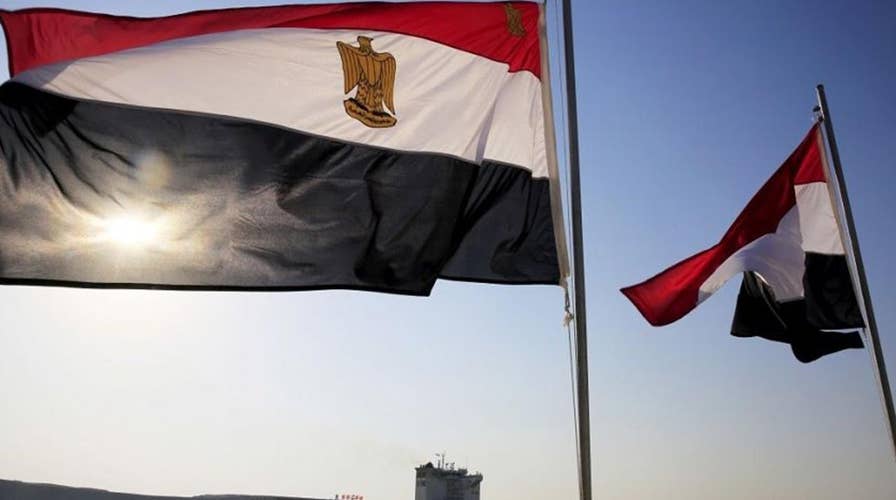More than 150 killed in Egypt mosque attack
Islamic militants bombed a mosque and opened fire on worshippers during a sermon.
The attack Friday on a Sufi mosque in northern Sinai, in which at least 235 people were killed and more than 100 were wounded, was the worst terrorist attack on civilians in modern Egyptian history. It was well-planned, highly coordinated and aimed at slaughtering as many people as possible.
But it should have been no surprise.
The Egyptian army has been battling ISIS-linked militant Islamists in the Sinai four years with limited success. But if the world knows little about this fierce ongoing struggle, that is no accident. The Egyptian government has imposed an almost total media blackout on its efforts to repress what is becoming a deeply embedded insurgency.
Egyptian president Abdul Fattah al-Sisi went on Egyptian television Friday evening to declare three days of mourning and denounce the attack, which he called the work of cowards. He vowed to respond with air strikes and “brutal force.”
But the use of such brutal force, which critics say is also indiscriminate, has created greater resentment among Sinai residents. It has also radicalized the local population and generated new recruits for the terrorists – even as most Egyptians reacted with shock and outrage to the assault on a holy mosque during the Muslim day of prayer, a rarity in the deeply religious country.
Friday’s attack was not only particularly gruesome, but worrisome to a government that has repeatedly claimed to be making progress in the war on jihadis.
While no group immediately claimed credit for the attack on the Al Rawda mosque in the town of Bir Al-Abed in northern Sinai, the culprits were almost surely the local branch of ISIS, also known as the Islamic State.
Local jihadis – members of a group formerly known as Ansar Bayt al-Maqdis – have pledged “bayat” or allegiance to the Islamic State in Sinai.
Friday’s attack represented an escalation in the jihadi campaign against President Sisi’s government, which has conducted a massive crackdown on opponents, critics, and the media in the name of bringing order and security to the nation of over 90 million.
Before Friday, the Islamic State in Sinai had concentrated its attacks on police, other security officials, and Egypt’s Coptic Christians (about 10 percent of the population).
But in publications and statements, jihadis have increasingly attacked Sufi Muslims. The 2 million to 3 million Sufis in Egypt practice a mystical form of Islam that ISIS and many other jihadi groups consider a form of heresy.
Friday’s attack was not only particularly gruesome, but worrisome to a government that has repeatedly claimed to be making progress in the war on jihadis.
According to numerous accounts, the attack began around noon when the Al-Rawda mosque, about 125 miles northeast of Cairo, was filled with worshipers. Security officials said that worshipers fled outside after a bomb, probably detonated by a suicide bomber, exploded inside the mosque.
Outside, another group of terrorists opened fire not only on those fleeing, but on ambulances attempting to reach the wounded. Egyptian security officials were quoted as saying the terrorists were heavily armed, with both automatic weapons and rocket-propelled grenades and sped off in vehicles – all indicators of a well-planned attack.
Israeli Transportation and Intelligence Minister Yisrael Katz said that Israel stood “shoulder to shoulder” with Egypt and other countries in the region in the war against “radical Islamic terror.”
Unstated was the fact that Israel has been working closely with Egypt to combat terrorism and control illicit weapons and personnel flows through tunnels in the Sinai between Israel and Egypt. But even such quiet Israeli assistance has not managed to quash the growing Islamist insurgency in Sinai.
Mohammed Sabry, an Egyptian journalist who knows Sinai well and is now in self-imposed exile because of President Sisi’s crackdown on critical voices in his country, says that the anti-terrorist campaign has been mismanaged for years. The campaign has been plagued by lack of indigenous support due to the Egyptian military’s brutality, extra-judicial shootings, and other violations of human rights, Sabry says.
Violence and protests rose in Sinai 2013 when then-Gen. Sisi came to power in a military takeover. Sisi ousted the democratically elected, but hugely unpopular, President Mohamed Morsi, who was the head the Muslim Brotherhood Islamist group.
Speaking with Michael Young, another Middle East expert, Sabry said that Sisi’s campaign suffers from a lack of intelligence and the growing alienation of Bedouin and other Sinai residents due to the government’s ruthless campaign.
Egyptian officials say that such measures are needed to contain ISIS in the Sinai. But ISIS attacks on Egypt, which depends on tourism as a mainstay of its economy, have escalated since Sisi’s Sinai campaign has begun.
While the government has been battling discontented Egyptians in Said for well over a decade, the Friday attack on Sufi Muslims was an ominous escalation that raises profound questions about whether Sisi's strategy is working, or backfiring.









































